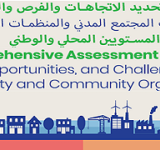Do You Know Who Governs Us? The Damned Monetary Fund
From May 3 to June 7,218 Jordanian protesters took the world by surprise. What had started as protests over a taxation draft law and an increase in gas prices quickly led to a popular rising against the neoliberal path on which the state has embarked. The rejection of neoliberal economic policy and the privatization of key national industries are not new to Jordan. But the centrality in which this analysis featured in the events of June’s rising (habbit [1] huzayran) is unprecedented. In the past,protests against the government’s economic nahj (path) were most strongly felt in workers’ circles,the governorates outside Amman and a few impoverished quarters inside the capital. This time,the coalition spread from the governorates to the heart of Amman,from the working classes to middle-income and high earners and from marginalized people to highly visible civil society organizations and activists,most notably women’s rights activists. Furthermore,liberal counter-narratives of advancing political awareness as opposed to what they see as simplistic “economic demands” have not been able to drown the voices of protesters and their central focus on opposing neoliberal economic policies.


